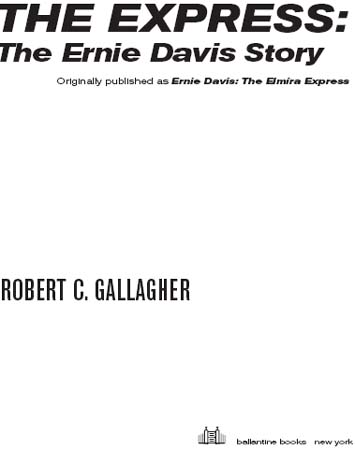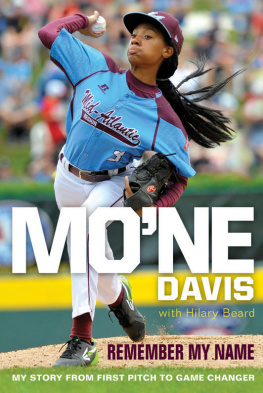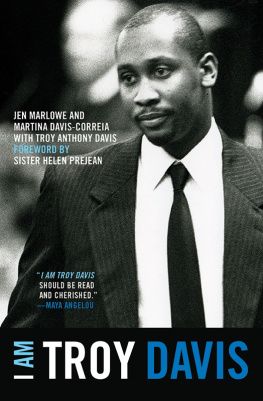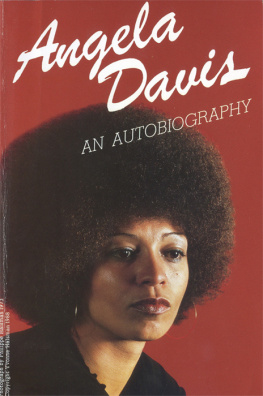

CONTENTS
To my family, Mom, Dad, Matthew, and Paula
for their vital contributions
A REMEMBRANCE
I n my twenty-one years of playing football I received over 150 trophies and plaques but I keep only one in my office, The Ernie Davis Memorial Award from the Coaches All-America game. The plaque has a picture of Ernie and was given to the player who best exemplified his qualities.
To this day I can vividly recall how impressed I was by Ernie. We first met when he visited my home in New Haven, Connecticut, with coach Ben Schwartzwalder, to recruit me for Syracuse University. I remember his size and how well-dressed he was. We went to dinner and Ernie took me aside. He briefly mentioned football and then emphasized the importance of an education. He said I would receive an academic scholarship, which would guarantee my education as long as I maintained the academic standards. I havent done badly, he said, for a guy who didnt have a dime. That conversation is how I remember him.
My entire family was impressed by him. My mother said, If that school graduates a person like Ernie, you should consider going there. My three sisters fell in love with him. In a letter he wrote of how much he enjoyed meeting my family and mentioned each of my sisters by name.
I was also being heavily recruited by the University of Notre Dame. In fact, I had committed to the Fighting Irish. I have a newspaper article with the headline, Little Goes to Notre Dame. I was reluctant to admit it to Ernie, however, and led him to believe I would go to Syracuse. When Ernie died I felt obligated to fulfill my promise to him. I called coach Schwartzwalder and told him Id be coming to Syracuse. It was one of the better decisions I ever made.
So many people loved Ernie at Syracuse because he spread so much love. He didnt have to be loud or the center of attention. You just knew he was there.
As a collegian I felt a tremendous responsibility to uphold the tradition Jim Brown and Ernie established. Every Syracuse student learns that tradition. It was a great honor to be mentioned in the same breath with them. Every time I put on the jersey number 44 that we all shared, I thought about them. They were the best. It motivated me to prove I was worthy.
Courage was Ernies outstanding quality. To excel as an athlete you have to play with pain. There is a difference between pain and injury. An athlete has to deal with pain. Put a Band-Aid on it and play is the credo. The only way they can get you off the field is by hiding your uniform or by dragging you off, kicking and screaming. Ernie exemplified that determination throughout his life, particularly while fighting against leukemia. He never quit.
Since Ernies death I have been involved in many ceremonies honoring him. At the first intercollegiate football game I ever saw, Ernies mother presented his Heisman Trophy to Syracuse University. When he was inducted into the College Football Hall of Fame, during a game at Meadowlands Stadium, Jim Brown and I escorted his mother on to the field. Whenever Ive seen her throughout the years, Ive made a conscious effort to represent Ernie and try to emulate his qualities.
Today there is a need for heroes. The pressures and challenges of life may seem overwhelming, particularly to youngsters. Heroes like Ernie Davis provide inspiration, incentive, and direction. His life strongly affected all who knew him. His lifes story will touch you.
Floyd Little
BACKGROUND
A young mans first hero often remains more sharply etched in his memory than his first love. Mine was Ernest R. Davis, who in 1961 became the first black football player to win the Heisman Trophy. He died of leukemia 18 months later without fulfilling his dream of playing professional football. Despite the tragedy of a life cut short, his story is more than a cheers-to-tears heartbreaker. Although fans recall an athlete and his achievements, friends remember a man and his character.
I never met Ernie personally, yet throughout my life by chance, coincidence, or the reminiscence of a mutual acquaintance, I would often recall his memory. I became a fan of his when I was ten years old, playing football in the backyards, fields, and streets of my neighborhood. Like many other boys my age, I dreamed of being an All-American, a Heisman Trophy winner, and even an All-Pro.
I lived in the Northern Virginia suburbs of Washington, D.C. The big college star of that time was Joe Bellino, All-American halfback and Heisman Trophy winner from the United States Naval Academy only 40 miles away in Annapolis, Maryland. We neighborhood boys used to vie for the honor of playing Joe Bellino in our pickup football games. I dont remember why we wanted to be college players rather than professionals. Possibly the pros hadnt yet earned the popularity they now enjoy or maybe the college players were closer to our age.
One day when another boy called Joe Bellino first, I said, Okay, Im going to be Ernie Davis of Syracuse. A playmate shouted, You cant be Ernie Davis, hes a nigger. Then to everybody else, He wants to be a nigger. I answered, Hes an All-American, which to me was a comeback of unassailable logic. I cant honestly say I was morally indignant. I was embarrassed. I had never experienced bigotry and didnt understand it. I wondered why a person could dislike someone because of their color. Stubbornly, I stuck with my choice.
Months later I discovered why the boy acted the way he did. In December 1961 we interrupted our football game in that same kids yard to watch the Syracuse-Miami Liberty Bowl game on television. Ernie and the Syracuse team played poorly in the first half. As we went out to throw the ball around during halftime, my playmate, remembering my earlier statement, said, I told you Ernie Davis wasnt any good. Hes a nigger. My embarrassment increased when his father said, None of those niggers are any good. While we were outside I silently prayed, with the fervor only a youngster praying for a hero can muster, that Ernie play well in the second half. With trepidation I went in to watch the rest of the game.
As if in answer to my prayers, Ernie played magnificently in the second half and rallied Syracuse to victory. At games end in righteous indignation I asked, What do you think of Ernie Davis now? My friends father answered, Hes still a nigger. I didnt respond, but I secretly gloated at the mans discomfort.
At that time Washington sports fans were eagerly anticipating watching Ernie play with the hometown Redskins, who had ostensibly made him the number one selection in the 1962 National Football League draft. I was disappointed when it was later announced that Ernie, in fact, had been traded by Washington to the Cleveland Browns prior to the draft.
After weighing offers from both the Browns and the Buffalo Bills of the rival American Football League, Ernie signed a then NFL record-setting rookie contract with Cleveland. However, his professional career ended before it began at the College All-Stars training camp.
I remember my disappointment when it was reported Ernie would not play in the annual exhibition game due to illness. Later, the newspapers described his condition as a blood disorder, which would prevent Ernies playing during the 1962 football season. Although Im sure that privately he was devastated by the news, publicly Ernie never changed. For months he had been signing autographs, Ernie Davis, Cleveland Browns, 1962. Despite the setback, he never gave up hope that he would overcome his illness. Eight weeks later, there was some good news. Ernie Davis had leukemia, but it was in total remission, and as long as the remission held, the doctors said Ernie could play football. According to the newspapers, the Browns management was divided over whether he should play. Ultimately Coach Paul Brown chose not to activate him.
Next page














